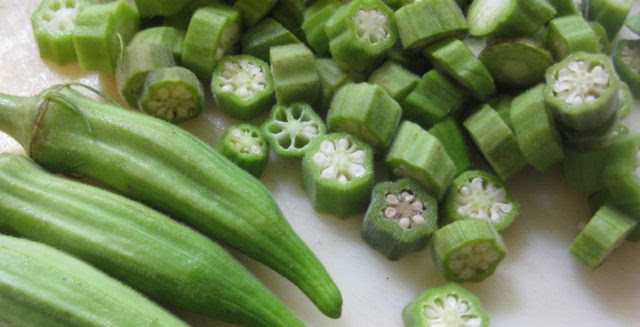Okro: Why Men, Women Should Be Wary Of Its Dangerous Sexual Effects

In 2017, a Senior Researchers, Dr. Ochuko Erikainure advised men of reproductive age to be wary of excessive intake of Okro as it could lead to infertility.
Many lovers of Okro soup have because of its slimy or“mucilaginous ” nature ignorantly believe that it would be beneficial to their sexual health. This may not be so from the latest research.
This adverse effect may not be unconnected with the act of taking and consuming raw Okro by some knowledgeable women who do not want to get pregnant while some do it ignorantly without knowing it is tantamount to taking contraceptive. This is so because it inhibits sperm production and destroys the motility of the sperm.
Dr. Erikainure was a Senior Research Officer at the Federal Institute of Industrial Research (FIIRO), Oshodi, Lagos. He is currently working at the University of KwaZulu-Natal, Durban, KwaZulu-Natal, South Africa.
Okra, though very nutritious, can lead to infertility in men of reproductive age, Dr Ochuko Erikainure, a Senior Research Officer at the Federal Institute of Industrial Research (FIIRO), Oshodi, Lagos, has warned.
According to him, too much consumption of okra, especially its seeds can lead to infertility in men of reproductive age.
Okro as a herb also has varieties of healthy values because of its vitamins, minerals and other vital nutritional values in it.
For instance, Okra water is one valuable health drink that is gaining popularity, because of the various health benefits it offers. It has become especially popular among women for the numerous benefits it provides, some of them being improved skin, vaginal and menstrual health.
From the information ganered on healthyactive.org., “Okra water has many other health benefits, including reducing inflammation, improving digestion, and lowering cholesterol levels. It is also a good source of vitamins and minerals; specifically vitamins C and K, potassium, and magnesium.
“…Okra water is also believed to increase milk production in breastfeeding mothers. The mucilage in okra also helps soothe sore nipples and prevent infections.”
While the aforementioned benefits may not be in doubt, its side effects in men, especially the damage it does to the spermatozoa calls for worry.
The inferences over the dangerous nature of Okro seed to the sperm only cast a contradistinction to its acclaimed benefits to women sexual health.
An online publication, www.medicalhealthguide.com says Okra, known in many English-speaking countries as lady’s fingers, is a flowering plant in the mallow family.
“Okra is an annual herb that is widely cultivated for its edible green seed pods in tropical, subtropical and warm temperate climates.
“Okra is a hardy plant that can grow even with less water and in hot conditions.’’
Erukainure said that okra has a unique substance called “GOSSYPOL”.
“Gossypol inhibits sperm production and motility by blocking several enzymes that are highly important in energy metabolism in sperm and sperm producing cells.
“Okra seeds are very rich in toxic pigment called Gossypol which promote infertility in men by arresting sperm production (spermatogenesis) even at lower dose.
“Gossypol are oil soluble and natural polyphenol secreted by plants as a defence against predators,’’ he said.
The senior researcher said that in some countries, okra seeds were, however, used for natural contraceptive for men.
“Due to proapoptotic activities in okra seeds (it means killing of cells), gossypol is still under investigation as a possible anticancer agent,” he said.
The nutritionist said that in spite of its effects in men, consumption of okra could be of health benefits to the diabetes, obesity or overweight people.
“Okra is very high in dietary fibres, reduce calories intakes into the body, ability to limit nitric oxide build up in the blood and lipid (fat) and reduces the risks of cancers.
“Okra is an African vegetable that has been a staple of African and Indian cuisine for many years, and also used for medicinal purposes.
“The health benefits of okra can be attributed to its nutritional and phytochemical constituents making it a vital crop.
“One hundred grammes of okra has been reported to meet over 20 per cent of the daily values which the body needs.
“It contains a rare combination of carbohydrates, vegetables, minerals and vitamins.
“Not less than 10 different vitamins and minerals can be found in okra such as vitamin A, which is great for the skin, vitamin C and E which prevent cell damage in the body,’’ he said.
Erukainure said because “okra is high in fibre, it has positive impact on digestive system which assist with gastrointestinal difficulties.
“Including okra in our daily diet along with physical healthy exercise routine will prevent and treat diabetes, meaning that okra plant contributes to a more active lifestyle”.
Erukainure said that okra has been identified to have insulin-like activity in experimented animals.
“It is also a potent anti-diabetic source, which can be attributed to its chemical constituents,’’ he said.
Sources: Healthy Active, The Guardian, medicalhealthguide.com, NewsTrack Nigeria



